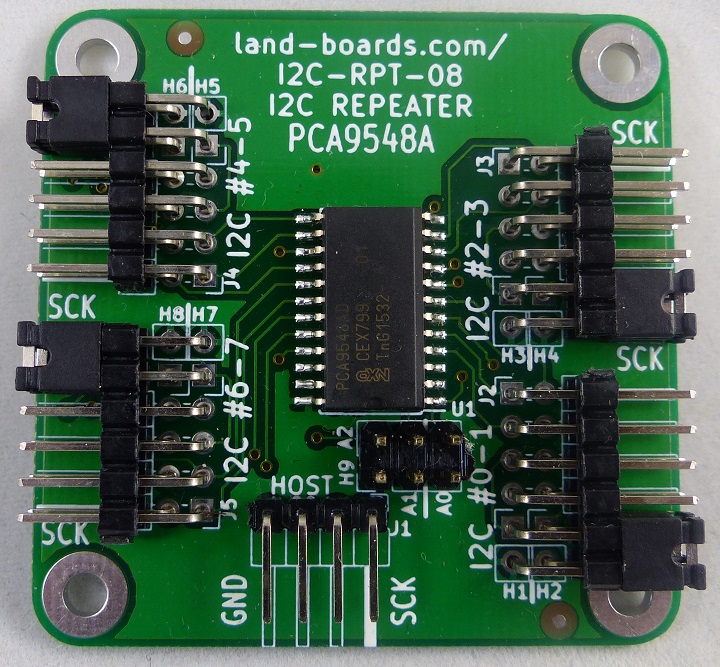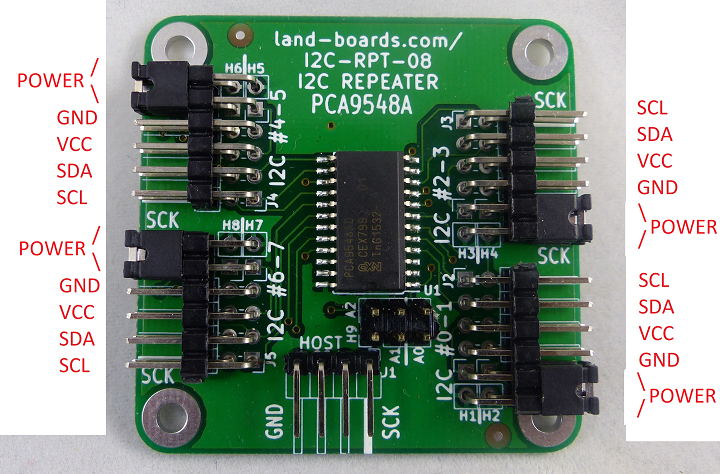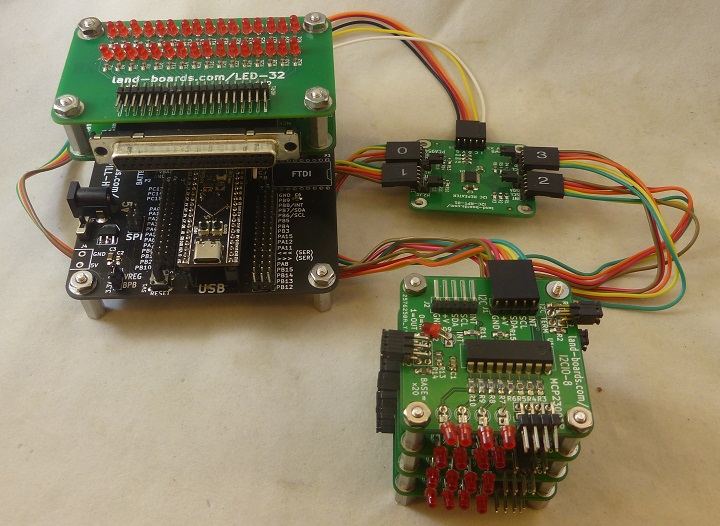Difference between revisions of "I2C-RPT-08"
Jump to navigation
Jump to search
Blwikiadmin (talk | contribs) |
Blwikiadmin (talk | contribs) |
||
| Line 1: | Line 1: | ||
[[File:tindie-mediums.png|link=https://www.tindie.com/products/9603/]] | [[File:tindie-mediums.png|link=https://www.tindie.com/products/9603/]] | ||
| + | |||
| + | [[File:I2C-RPT-08-X1-P218-720px.jpg]] | ||
<video type="youtube">npC48tq4MF8</video> | <video type="youtube">npC48tq4MF8</video> | ||
| − | |||
| − | |||
== Features == | == Features == | ||
Revision as of 11:45, 3 April 2022
Contents
Features
- I2C Hub / Repeater / Replicator / Multiplexer / De-multiplexer / Switch
- PCA9548A Datasheet
- Eight I2C Ports
- 100KHz/400KHz operation
- I2C Base Address 0x70
- Offset addresses 0x70-0x77
- Host port
- Controlled via I2C
- 3.3V or 5V host operation
- Can power slave cards if they are at the same voltage
- 3.3V or 5V slave ports operation
- Removable jumper(s) to supply power from slave
- Voltage translation between the ports
- Ex: a Raspberry Pi which runs 3.3V can control I2C devices which run at 5V
- On-board 2.2K termination resistors
- 49x49mm form factor
- 4 solid 4-40 mounting holes
- Drivers/Example Code
- Arduino driver and example code
- Raspberry Pi example code
Connectors
- 0.1" pitch connections
- Search ebay for Dupont headers
- Search ebay for Dupontwire jumper cable
- The slave I2C connectors are (4) 2x6 right angle 0.1" pitch headers
- Two ports per 2x6 connector
- Two of the pins are for power to or from the I2C connector
- The other four pins are for the I2C interface
H1-H8 - Power to/from I2C Connectors
- Install shunt to power the I2C slave card from the I2C-RPT-08 Card
- Default factory ships as installed to power external I2C interfaces from the card
- Remove shunt to power interface externally
- Need to remove if external voltage is different level or sourced externally
- H1 - PORT #0
- ...
- H8 = PORT #7
H9 - I2C Slave Address Jumpers
- A0-A2
- Install all 3 jumpers for address 0x70
- Remove all three jumpers for address 0x77
J1 - Host I2C Connection
- GND (GND pin marked)
- 3.3V or 5V VCC
- SDA
- SCL
J2-J5 - Slave I2C Connections (x8)
- GND
- 3.3V or 5V VCC (Power Out - if jumper 1-2 installed, Power in - if jumper 1-2 is not installed)
- SDA
- SCL (Board marked with SCK)
Jumpers
A0-A2 - Multiplexer I2C Base Address
- Install for Ax = 0 (factory default address = 0)
- Remove for Ax = 1
Schematic
Drivers/Example Code
- Github repo - Arduino Driver code
- Github repo - Arduino Example code
- Raspberry Pi Example Code
Programming Note
- The mux chip allows multiple or single I2C ports to be written at the same time
- To only enable one port at a time make sure you disable a channel after use or disable last channel used before enabling new channel
Testing
Test Station Hardware
- Arduino Based Test Station
- Built in I2C mux on BLACK-PILL-HUB is set to offset=0x1 so it does not conflict with I2C address of UUT
- Cabling
- UUT J5 Host connects to I2C port (J7) on the BLACK-PILL-HUB
- UUT J5 Host INT pin Jumper from PB6-SIG to
- Uses 8x of I2CIO-8 cards
- Cabling 5 wire from I2CIO-8 cards J1 to UUT I2C #0-#3
- Address jumpers are all installed for base address of 0x20
- On Unit Under Test (UUT)
- Install (3) jumpers into A0-A2 for card I2C address = 0x70
Test Procedure
- Run puTTY
- COM port from Device Manager
- 9600 baud
- No parity
- No handshake
- Menu will display
Checking if EEPROM is present on UUT...EEPROM is not present on UUT Count of I2C devices in range 0x20-0x27 on UUT = 0 Found external I2C mux card Select I2C Mux board type 1 - I2C-RPT-01 board 2 - I2C-RPT-08 board
- Enter 2
- Replies with
Init I2C-RPT-01 card I2CIO8 card #0 was detected I2CIO8 card #1 was detected I2CIO8 card #2 was detected I2CIO8 card #3 was detected I2CIO8 card #4 was detected I2CIO8 card #5 was detected I2CIO8 card #6 was detected I2CIO8 card #7 was detected C=Card Tests, D=Direct, E=EEPROM, I=access Internal DIGIO32
- Verify that all 8 I2CIO-8 cards were detected
Internal Tests
- Select C to test card
- Select I to run internal tests
UUT Internal card tests Test PASS = 1, FAIL = 0
Bounce LEDS
- Select B to bounce LED across LEDs on all 4 I2CIO-8 cards
- Verify all 16 LEDs blink
- Hit any key to stop blinking
Hit any key to stop test
Test Station Software
Rev 1 Issues
- Silkscreen shows SCK, should be SCL



